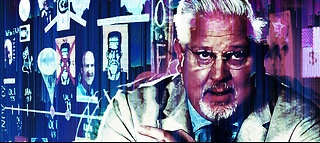‘Smart City’ Surveillance Program to Start in Netherlands | Human Factory Farm Plans to Grow Babies
Apeldoorn has been turned into the Netherlands' first "Smart City" by the World Economic Forum (WEF), without consulting its residents. An unknown Austrian company, RadioLED, has rolled out a 5G network in the city, based on a secret agreement with the municipality. The municipality receives no revenue from the project; the control lies entirely with RadioLED. That company also manages the data obtained from thousands of sensors tracking Apeldoorn citizens everywhere.
NL: https://deanderekrant.nl/nieuws/apeldoorn-in-het-web-van-het-wef-2022-02-06
NL: https://eindtijdnieuws.com/het-wef-begint-geheime-smart-city-operaties-in-nederland-te-beginnen-bij-apeldoorn/
NL: https://stralingsbewust.info/2022/02/01/apeldoorn-eerste-smart-city-op-basis-van-geheime-overeenkomst/
Apeldoorn Smart City is just one of the many projects the WEF is implementing in the Netherlands. The network organization based in Davos, Switzerland, is intertwined through many tentacles with Dutch policymakers - from Queen Maxima to Sigrid Kaag and Mark Rutte - implementing the globalist agenda of great leader Klaus Schwab, "the Great Reset. Schwab aims for a global "4th Industrial Revolution," which, among other things, should lead to a "digital identity" for every earthling and even a fusion of man and technology, through the implantation of chips in the human body. However, criticism of the WEF's influence is mounting. The organization is undemocratic and the agenda carried out by its ambassadors in the Netherlands is not subject to parliamentary or public debate.
Schwab himself makes no secret of the influence he wields. In a 2017 interview at Harvard, he openly says that the WEF penetrates governments. "At a reception for Canadian Prime Minister Trudeau, I realized that half of his cabinet had gone through my Young Global Leader program," he said. The same is true for the government teams of Argentina and France. The WEF offers training for "political talents" that has been gone through in the past by numerous world leaders, including Angela Merkel, Emmanual Macron, Nicolas Sarkozy, Tony Blair and Bill Gates. "Schwab can call any world leader," revealed WEF member Ben Verwaayen, Officer in the Order of Orange Nassau, in an interview.
Citizens sidelined
A public 5G network has been rolled out in Apeldoorn by Austrian tech company RadioLED, a first in the Netherlands. But what this company does with the data it collects on Apeldoorn citizens and what other agreements are in place with the municipality are being kept secret. Inquiries with the municipality yield nothing.
Apeldoorn is the first municipality in the Netherlands to start the Smart City Project in late 2021. A project in which the city - in cooperation with the tech company RadioLED - will be equipped with a lightning-fast and free public 5G network, with traffic lights that regulate that cyclists do not have to wait too long for a green light when it rains, lights at an intersection that indicate whether another road user is approaching and sensors that keep track of how clean the outside air is.
All of this should contribute to a livable city and its approach to sustainability, climate, housing and traffic issues. Proponents say, "Smart, this will make city living more efficient, easier and more fun." But what do we really know about the company RadioLED? Specifically, what does the Smart City Project entail and who benefits? How many antennas will be added and where will they be hung? Do citizens have a say? When will it be the rest of the Netherlands' turn? And also: what about privacy and what are the health risks?
RadioLED is an Austrian tech company that develops, builds and operates wireless networks with its own patented technology at home and abroad. To implement the Smart City Project, the Municipality of Apeldoorn and RadioLED signed a secret agreement in 2021 authorizing RadioLED to attach 500 small transmitters (square white boxes) to lampposts. The cost so far amounts to 1.7 million euros. By the way, the project comes from the quiver of the World Economic Forum (see article on p. 8-9).
In the future, the number of white boxes in public outdoor spaces will be expanded. The total cost of this project is estimated to be 17.8 million euros and will be borne entirely by RadioLED. About how this investment will be recouped, the company does not disclose, but it is obvious that it will involve collecting and selling data. A lucrative business in which the citizen is the child of the bill. The Municipality of Apeldoorn receives no revenues from the Smart City Project; all profits are for RadioLED.
So the full control of the Smart City Project is in the hands of an unknown Austrian tech company. Nevertheless, the Municipality of Apeldoorn's site states that they are shaping the Smart City Project "together with residents, companies, education and knowledge institutions. In doing so, we always ask ourselves the question: do we want what can be done?" But why then did the municipality enter into a secret agreement with RadioLED? And why does the Municipality of Apeldoorn answer citizens' questions by saying that they should turn to RadioLED with substantive questions about the Smart City Project? And are residents actually waiting for the Smart City Project?
Certainly not the members of the Concerned Citizens Working Group. One of the initiatives of this workgroup is the petition 'Stop Smart City Apeldoorn and the rollout of RadioLED's boxes' in which the Apeldoorn administrators are called upon to immediately halt the implementation of the Smart City until citizens have been fully informed and have been given a say and access and until there is clarity about the liability of damage in the field of privacy and/or health.
The secret deal that Apeldoorn made with RadioLED is very reminiscent of the -at the time- also secret deal that the Ministry of Economic Affairs made with telecom companies, in which it was stipulated that municipalities would be sidelined and the Dutch population could not object to the rollout of (future) wireless communication networks.
Apeldoorn may be the first municipality in the Netherlands to implement the Smart City Project, but it is also on the agenda for the other municipalities. However, the political debate on the radiation and 5G dossier in political The Hague has now completely died down. Nonetheless, the advisory report '5G and Health' published by the Health Council in 2020 shows that the impact of 5G on health is partly unexplored, that the actual health risks are not known and that a connection between 5G and health damage for a number of diseases cannot be ruled out. In fact, this makes us guinea pigs. This report was on the agenda in the House of Representatives three times in late 2020, but its discussion was postponed each time. Since then, no politician has returned to it.
The first phase of 5G (auction 700, 1400 and 2100 MHz) is now a reality. Proceeds for the state: 1.23 billion euros. The second phase (auction of 3.5 GHz) is scheduled for the end of 2022. That will bring us nationwide coverage through an extensive network of 5G small cells (micro antennas). With that, our privacy will literally end up in the streets and the door to a surveillance state will be wide open.
TRANSLATED with: https://www.deepl.com/translator
-
 13:21
13:21
Be Free
2 months agoGlenn Beck Exposes the “JOINTLY OWNED” coronavirus-vaccine between Moderna and US Gov (NIAID)
6.53K2 -
 2:39:22
2:39:22
Drunk3PO
18 hours agoStar Wars, Achromatic Chronicles Green, & More | Drunk3po Live
14.8K5 -
 7:11
7:11
Film Threat
1 day agoTHE STRANGERS: CHAPTER 1 | Film Threat Reviews
9.65K4 -
 25:22
25:22
MYLUNCHBREAK CHANNEL PAGE
17 hours agoTartaria, Russia & The Old World?
12.6K25 -
 15:08
15:08
justintech
22 hours agoCorsair Vengeance i8200 Review - 14900K + 4090
9.96K2 -
 11:31
11:31
ryanhoguepassiveincome
16 hours agoTOP 5 NICHES 🔥 Print on Demand Niche Research # 207 — (5/12/2024)
10.1K2 -
 51:31
51:31
Science & Futurism with Isaac Arthur
1 day agoAutomated Justice
11.7K6 -
 28:23
28:23
TampaAerialMedia
23 hours agoMiami Travel Guide - Downtown, Key Biscayne, Coral Gables
8.26K2 -
 8:05
8:05
Ethical Preparedness
17 hours agoEASY Homemade Allergy Medicine - Medical Prepping for SHTF - Natural Medicine
5.71K8 -
 20:48
20:48
JoBlo Originals
1 day agoWhat Happened to WES STUDI?
15.3K8